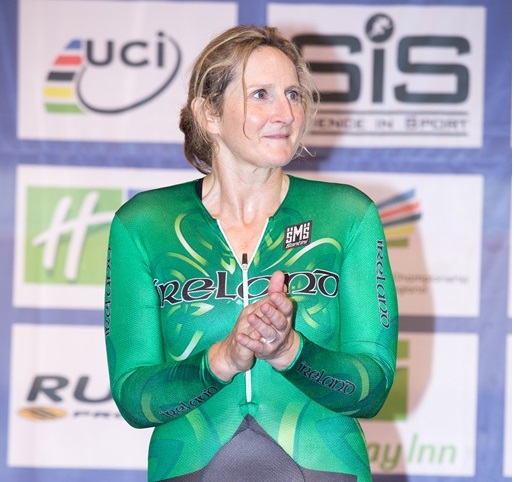
Orla Hendron is one of the major forces behind women’s cycling in Ireland. The former Vice President on the Cycling Ireland Board of Directors is also the junior women’s development coach, former coach of the Cycling Ireland women’s talent team and is now stepping down as National Child Protection Officer, a role she established and developed. A top cyclist in her own right, Orla is als a double World Champion in Masters Track Cycling.
We recently caught up with Orla and talked about all things cycling.
How did you get into the sport?
How I got into cycle racing, well I was competing in triathlon, and also was involved with raising money for Crumlin Hospital. A few of my friends were very involved in raising money for the hospital through a charity cycle, and I gave them a hand. They ended up raising a lot of money, so I went with them on the cycle to Arizona, and met IVCA member Arthur Ebbs while out there. He was telling me all about the IVCA (Irish Veteran Cyclist Association) and racing, and he said I should give it a go, and I thought ‘great’ and that’s where I started, racing with the IVCA.
At the same time I was friendly with Kate Rudd from the triathlon scene, she was bike racing in the women’s Boot Inn Leagues, so I came along to a few of them. That’s where I met Valerie (Considine – co-founder of the Women’s Commission), she was pregnant at the time, and one night I gave her a lift home. She explained all the stuff she was doing for women’s cycling, so I said I would give her a hand…. And that’s how it all started, I’m still giving her a hand! It was the start of a beautiful friendship… I joined the Women’s Commission in 2003, not long after I started racing on the bike, and I suppose in a way I now can’t get off it!
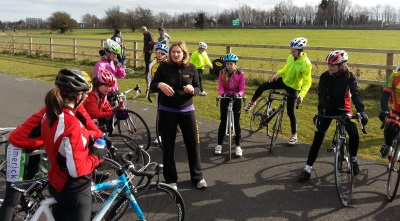
The Women’s Commission is doing a great job in recruiting women into bike racing..
The Women’s Commission is operating very well, part of this is because of Paddy Doran who mentored us, and we really have just followed his guidelines with running training camps and development programmes. In a way it’s mad that it is considered such a success as it follows the same principles of a lot of other commissions, but it just works.
What do you love most about cycling?
I suppose I really enjoy the people that I train with, the friends that I’ve made. I love the banter that I have training, the whole before during and after.
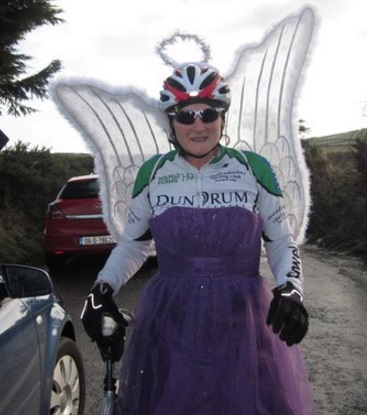
I really enjoy seeing the women’s scene growing, do you know there have been times in the past year when I’ve been thinking ‘this is amazing’. We have a big bunch of women in the races, and it’s great to be watching the racing happen, not just making it happen. I’m very proud; the racing is good. I’m very proud that the races are aggressive, the women ride hard, it’s good aggressive racing out there.
My favourite sessions are the derny sessions in Sundrive with my coach Mark Kiely. You do a good hard session in the morning and then we all go for breakfast after. I love the social aspect to them.
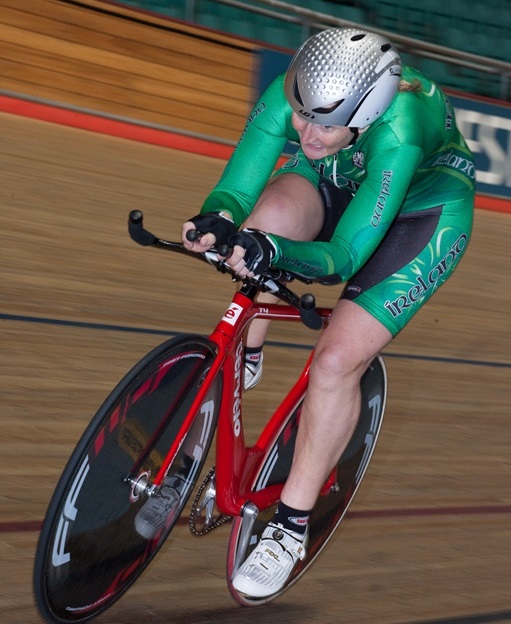
What would you like to change?
I would love to see the level 2 coaching qualification coming in. There is a really good coaching pathway in Cycling Ireland, with a very good foundation for beginner coaches, but now I would love to further my own coaching, the learning side, the level 2 course would be another step. For myself I would also like to spend a couple of months or weekends in Aigle learning there, get really engrossed in coaching.
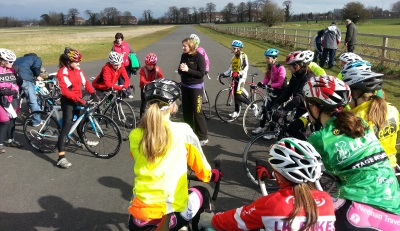
Another thing that I’d like to see is a structure with development officers around the country. If they were there it’d mean they could organise training camps and then I could just turn up as a coach, as it is if we are having camps I’m organising them so I can’t coach at them too. A club development officer would also be great, they could show clubs how to develop. If they can educate clubs on how to develop then the clubs would be better able to deal with issues before they arise. It would also motivate people to do something within the club.
There is a lot of volunteerism in cycling, and a lot of very good people doing a lot of work. Sometimes, though, the same people are relied on all the time. If there were more paid employees doing more of the development stuff, I think this would take a load off the same people taking on a bulk of work
I would love to know that there is always a woman on the Board of Cycling Ireland. The reality is that in order for women to be seen or heard we need one there. I would also like to see our National League getting the same level of recognition and support as the men’s one. We have put a lot of work into having a good working league, getting a sponsor and our numbers have grown from 12 at each race to over 40 over the past few years.
With the women’s racing I think that the grading system made it more difficult for women to race in the open races. When I started we used to race in a separate race with the juniors and vets, so what used to happen is the strong riders used to attack and head off up the road and the rest of us would race it out with the weaker vets and junior men, who were closer to our ability. Now with the A3 or A4 men they are very strong, but don’t have the finesse of the vets and juniors. The flip side of that, though, is that there are now more clubs open to putting on women only races, so that’s an easier pathway. This goes hand in hand with numbers, the more clubs that put on these races, the more the race scene grows. Like anything, build it and they will come.
What do you see as the biggest reason why you want to encourage more women into the sport?
I suppose I have always done sport myself, as a kid I did horse riding and hockey. I did loads of sports really, and was good at most, but not exceptional at anything. Cycling is a sport that maybe I could have been exceptional at if I started younger. I want to give people a sport that they might be good at, the reason why I work so hard with the kids is I want them to have the opportunity to see how good they can be at cycling. But cycling is a sport they can take up at any stage of their life. The skills they learn as a child they won’t lose. You can excel at any stage, but because they are learning the skills now they will always have them. Even if the kids I coach now give up cycling until they are thirty, they will come back with these skills.
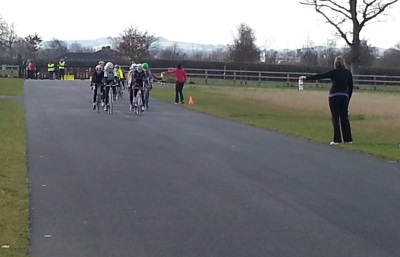
From the high performance side, I think it’s getting better as well, because now when they start they can see a pathway is there from youth to junior. We still have a bit of work with seeing it follow through to senior, but hopefully with the next Olympic cycle this will be clearer again.
What are the biggest obstacles for women in the sport?
Time is one obstacle, but I think a belief in themselves is the biggest. I think Bike for Life is a great programme for helping women into the sport. Actually in Orwell Wheelers we started off a women’s programme before the Bike for Life one was launched. A girl in the club, Celeste Marin, noticed that every time a new beginner turned up to cycle it slowed the overall progress down. So we decided to start an 8 week block course, and it really helped. Now we run the Bike for Life structured courses.
Ann Horan ran a good one this summer linked to the Great Dublin Bike Ride, and 50 women joined Orwell out of it. We tied this in with the Corkagh Park racing league, Ann encouraged them to try out the races, and they loved it. We are just finished a training camp in Bunclody where 18 Orwell women turned up! Through the course they learned the skills and really started to believe in themselves. They meet like-minded women and meeting more experienced women also, and all in a comfortable environment. They can hear that the stories of other women coming into the sport are no different to their own stories.
At the last camp Fiona Meade came along and talked about her career in cycling, from how she started to winning the National Championships and racing at the Worlds. They could see that the same as themselves she came from being a leisure cyclist and adventure racer to getting all the way to the top. These opportunities are there. In the Women’s Commission we have always engaged other women, so it’s women helping women.
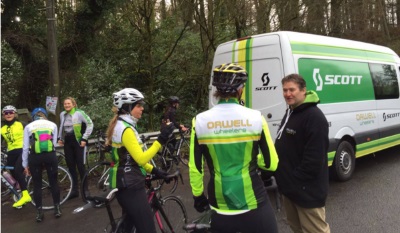
I’m so proud of the Women’s Commission, like there is a training camp this week, and Nicole Evans is coming up to do coaching. She is studying sports in Waterford, she’s following the same pathway as another cyclist Lauren Gourlay who did her internship in Aigle. Through women’s cycling their sporting careers have been progressed. The Women’s Commission has been a great pathway for them. There are a lot of career opportunities in cycling, and through us people have a pathway.
If you were given €1million for spending on cycling – how would you invest it?
I would spend it on facilities. A million euro wouldn’t build a velodrome, but it would build a lot of Corkagh Park type facilities around the country. That is the way to go. But these places would have changing rooms as well, fully kitted out.
Corkagh Park is a great track, it’s just not utilised as much as it should. The circuit is fantastic for learning. I would probably build a few tracks that would be more race orientated too.
You were a major force behind the implementation of the CPO policy, were National Child Protection Officer for years, why is there a need for this in cycling, or in sport?
I took on this position because I was on the Board of Cycling Ireland, and I wanted to expand my responsibilities. We needed more attention to child protection and a more active CPO (Child Protection Officer). I said I would do it. It is such an important role, it’s about encouraging more people to do child protection courses, educating clubs on putting in a structure where if there are issues they take them up with the CPO in the club. They may then take up those issues with me. You end up dealing with quite sensitive issues and cases.
Thankfully there haven’t been too many cases to deal with, and what we have come across so far has actually led to better practice within our racing scene.
There is huge scope to develop this role, and to increase the safeguarding workshops, and really promoted best practise. I have to step down from this role, as the role deserves someone who has more time to really progress it and drive it forward.
If you want to get involved with women’s cycling check out www.womenscycling.ie
